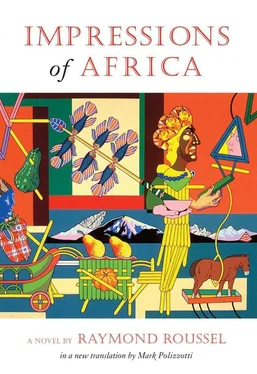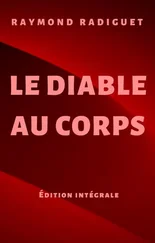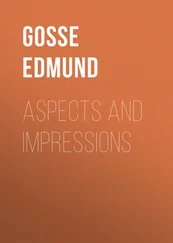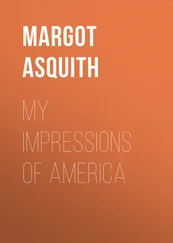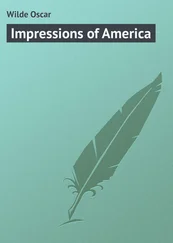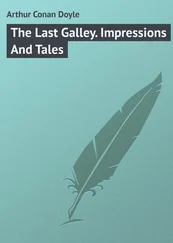A trained magpie perched motionless on the alluring captive’s left shoulder.
Just then, Louise spotted Yaour’s body, still laid out in Gretchen’s costume in the shade of the withered rubber tree. Violent emotion played over her features and, clasping a hand to her eyes, she wept nervously, her breast wracked by terrible sobs that accentuated and quickened the chords from her shoulder braids.
Talou, losing patience, barked several unintelligible words that snapped the unhappy young woman back to attention.
Swallowing her grief, she reached her right hand toward the magpie, whose two claws hopped readily onto her proffered index finger.
With an expansive gesture, Louise stretched out her arm as if to launch the bird, which took wing, then landed in the sand before the statue of the helot.
Two barely perceptible openings, more than a yard apart, pierced the visible façade of the black plinth almost at ground level.
The magpie approached the farther opening and jabbed in its beak, activating some inner spring.
At once, the railway platform began to tilt, slowly sinking into the plinth on the left while rising above ground level on the right.
Its equilibrium broken, the vehicle bearing the tragic effigy trundled slowly over the gelatinous tracks, which now lay on a fairly pronounced slope. The four wheels, made of black strips, were kept from derailing by an inner lip that extended slightly beyond the rims and held them fast to the rails.
Reaching the bottom of its short descent, the small wagon was abruptly halted by the edge of the plinth.
During the several seconds the journey required, the magpie had hopped over to the other opening, into which its beak energetically poked.
Following a second activation, the movement occurred in reverse. The vehicle, gradually lifted, then pulled to the right by its own weight, rolled motorless over the silent rails and butted against the opposite edge of the plinth, which now stood as an obstacle to the lowered platform.
This seesaw motion was repeated several times, with the magpie constantly flitting between one opening and the other. The helot’s statue remained fixed to the vehicle as it rode back and forth, and the whole was so light that the tracks, despite their lack of substance, showed not the slightest trace of flattening or damage.
Talou watched in awe the success of the perilous experiment that he himself had conceived, without thinking it possible.
The magpie stopped its maneuvers of its own accord and with a few flutters of its wings reached the bust of Immanuel Kant; from the top of the stand, at left, jutted a small perch on which the bird alighted.
No sooner had it done this than the inside of the skull shone brightly, its exceedingly thin walls perfectly translucent above the brow line.
One could divine the presence of many reflecting mirrors facing in all directions, judging from the dazzling rays, representing flames of genius, that burst violently from the incandescent light source.
Often the magpie flew up, only to land back on its perch again, alternately extinguishing and relighting the top of the skull, which alone shone brilliantly while the face, ears, and neck remained in darkness.
With each landing, it was as if a transcendent idea were hatching in the thinker’s suddenly illumined brain.
Abandoning the bust, the bird alit on the wide stand featuring the band of thugs; once again its prying beak, this time thrusting into a narrow vertical pipe, activated a certain delicate concealed mechanism.
To the question “Is this where the fugitives are hiding?” the nun blocking entrance to her convent answered a persistent “No,” shaking her head from side to side after each forceful jab of the bird’s beak, as if it was pecking for grain.
Finally, the magpie arrived at the platform, smooth as a floor, on which the two last statues stood; the spot the intelligent creature chose to land on featured a delicate rosette, which sunk half an inch under this slight extra weight.
At that instant, the regent bowed even more deeply to Louis XV, whom this obeisance left unmoved.
The bird, hopping in place, provoked several more ceremonial greetings, then fluttered back to its mistress’s shoulder.
After one last, long glance at Yaour, Louise descended back into her cabin and slammed the skylight shut, as if impatient to resume some mysterious task.
THE FIRST PORTION of the ceremony had ended and the Incomparables’ gala could now get underway.
But first, there would be one final opportunity for trading shares.
The black warriors moved farther aside to clear the approach to the Stock Exchange, around which the passengers from the Lynceus gathered.
Five stockbrokers, played by the associated bankers Hounsfield and Cerjat and their three clerks, sat at five tables set up beneath the building’s colonnade, and within moments they were calling out the rhymed orders that the passengers feverishly placed with them.
The stocks were named after the Incomparables themselves, each represented by one hundred shares that rose or fell in value depending on predictions regarding the players and the outcome of the contest. All transactions were handled in cash, in French or local currency.
For a quarter of an hour the five middlemen ceaselessly shouted execrable lines of verse, which the traders, following the fluctuations of the stock quotes, improvised hastily and with copious amounts of padding.
Finally, Hounsfield and Cerjat signaled the close of business by getting up from the table and walking down the stairs, trailed by their three clerks; they joined, as did I, the players crowding back into their former places, their backs to the prison.
The dark warriors again lined up in their original order, though at Rao’s command they avoided the immediate vicinity of the Stock Exchange to allow free passage.
The gala performance began.
First the four Boucharessas brothers made their appearance, each wearing the same acrobatic costume, which consisted of a pink leotard and black velvet trunks.
The two eldest, Hector and Tommy, lithe and vigorous adolescents, each carried in a solid tambourine six dark-colored rubber balls. They walked in opposite directions and soon turned to face each other, stopping at two very distant points.
Suddenly, at a softly called signal, Hector, who was standing near our group, vigorously launched his six balls one by one from his tambourine.
Meanwhile, Tommy, standing at the foot of the altar, successively projected from the musical disk in his left hand all his rubber projectiles, which crossed paths with his brother’s.
This first feat accomplished, each juggler began bouncing individual balls back to his opposite number, effecting a constant exchange that now continued without interruption. The tambourines vibrated in unison, and the twelve projectiles formed a kind of elongated arc in perpetual motion.
Thanks to the perfect synchronicity of their movements, combined with a marked physical resemblance, the two brothers (one of whom was left-handed) gave the illusion of a single person reflected in a mirror. For several minutes the tour de force went on with mathematical precision. Finally, at a new signal, each player caught half the projectiles in the hollow of his upturned tambourine, abruptly ending the to and fro.
Immediately, Marius Boucharessas, a bright-looking ten-year-old, ran forward while his two older brothers cleared the area.
The child carried in his arms, on his shoulders, and even on top of his head a collection of young cats, each wearing a red or green ribbon around its neck.
With the edge of his heel, he drew two lines in the sand about forty to sixty feet apart, parallel to the side occupied by the Stock Exchange. The cats, jumping spontaneously to the ground, posted themselves in two equal camps behind these conventional boundaries and lined up facing each other, all the green ribbons on one side and all the red on the other.
Читать дальше
